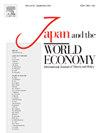应对COVID-19大流行的支出措施
IF 1.2
4区 经济学
Q3 ECONOMICS
引用次数: 3
摘要
我们研究了COVID-19传染如何影响消费者支出模式。我们发现,老一代和年轻一代对COVID-19大流行的消费支出反应存在显著差异。我们发现,在大流行期间,老年人的支出至少比年轻一代少5%。事实上,60岁以上的人甚至在食品和饮料上的支出也大幅减少了13%。我们还发现,老年人放弃购物,转而支持年轻一代。这些反应可能是由于对COVID-19感染的恐惧(Immordino et al., 2022)。本文章由计算机程序翻译,如有差异,请以英文原文为准。



Expenditure responses to the COVID-19 pandemic
We examine how the COVID-19 contagion influences consumer expenditure patterns. We show that the consumption expenditure responses to the spread of the COVID-19 pandemic are significantly different between the older and younger generations. We find that older adults spend less than the younger generation by at least 5% during the pandemic. In fact, those aged above 60 significantly decrease their spending even on food and drink products by 13%. We also find that older adults forgo shopping in favor of the younger generation. These responses might be due to the fear of COVID-19 infection (Immordino et al., 2022).
求助全文
通过发布文献求助,成功后即可免费获取论文全文。
去求助
来源期刊

Japan and the World Economy
ECONOMICS-
CiteScore
2.60
自引率
0.00%
发文量
26
审稿时长
46 days
期刊介绍:
The increase in Japan share of international trade and financial transactions has had a major impact on the world economy in general and on the U.S. economy in particular. The new economic interdependence between Japan and its trading partners created a variety of problems and so raised many issues that require further study. Japan and the World Economy will publish original research in economics, finance, managerial sciences, and marketing that express these concerns.
 求助内容:
求助内容: 应助结果提醒方式:
应助结果提醒方式:


